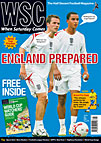 We may never know the truth about what preceded Tottenham's vital clash with West Ham. But, as Luke Chapman reports, it left players and fans alike sick to the stomach in more ways than one
We may never know the truth about what preceded Tottenham's vital clash with West Ham. But, as Luke Chapman reports, it left players and fans alike sick to the stomach in more ways than one
Is the Premier League run for the benefit of all their clubs or just a select few? Incensed Spurs fans will argue the latter, after what happened in their final game of the season.
The bare, if still disputed, facts are that on the morning of arguably the most important game in Tottenham’s recent history, ten players, including seven key first-teamers, went down with suspected food poisoning.
West Ham agreed to a postponement, while the police vetoed a four-hour delay. The Premier League, whose chief executive Richard Scudamore was enjoying Arsenal’s hospitality, offered a two-hour delay. Advised by club doctors that two hours would make no difference and with an implied “accept-the-consequences” ultimatum from the League, Spurs reluctantly decided to play. Scudamore’s announcement from Highbury that the Spurs game would go ahead compounded the anger. What was already a difficult game at Upton Park became a near-impossible one and Spurs lost.
Media coverage was in places predictably flippant. Match of the Day virtually ignored the controversy, while radio phone-ins took the line that it was just “fate”. The broadsheets and tabloids both seized upon a whodunnit along with lame toilet gags. It is easy to sound po-faced; had the situation been reversed, Spurs fans would have found it just as amusing. But should players who were incapable of taking to the pitch have risked health or injury by doing so? Some were vomiting just moments before kick-off; others, including Aaron Lennon, reportedly collapsed after the final whistle.
Subsequent tests suggested the illness was not caused by food poisoning but more likely a viral infection. The furore over the cause, however, obscured a more troubling issue. Daniel Levy wrote an open letter to the Premier League, requesting a replay, reportedly with the backing of 75 per cent of the body’s chairmen. The letter posed some important questions the media had neglected to ask, such as why was the game not postponed. Others voiced the more hypothetical consideration as to whether the game would have been called off had it been “other” clubs involved.
Spurs later cited the postponement of a Spanish Cup game between Atlético Madrid and Real Zaragoza in January in almost identical circumstances. The club also questioned the lack of clarity in the rules, referring to the experience of an injury- and illness-hit Middlesbrough in 1996, when they were deducted points after failing to play Blackburn.
The League’s response was swift. It was also inaccurate, overstating the number of fit players available. But the result stood and Spurs had no leg to stand on. The PL reasoned that as Spurs were able to fulfil the fixture, rule E 13.4 concerning postponements did not apply.
This was surely a case of adding two and two and making five: players might have been ill but they played, ergo, they were fit to play. It was a line of reasoning echoed by that expert on gastric diseases, Steve Claridge, saying: “They looked all right to me.” His Five Live colleague Mark Saggers suggested that as Jermain Defoe was out in a nightclub that night, the players must have been fit – forgetting to mention that Defoe was one of the few who was not ill. As for the question of precedent, the League simply dismissed this out of hand.
To date, Spurs have not followed up their initial letter, leaving some fans to criticise the board for not pursuing the implied suggestions of double standards. Other questions fans had were left hanging in the air. Why was Arsenal’s visit to Portsmouth in March postponed, three days before meeting Juventus in the Champions League? The reason was a waterlogged pitch, a decision that bemused many at Fratton Park. The fundamental question remained unanswered: why is the vice-chairman of Arsenal – or indeed any club – allowed to sit on the board of the Premier League, despite the rather obvious potential for a clash of interests?
There’s an irony that Spurs fans should feel victims of the realities of corporate football, given that their club was one of the prime movers in the commercialisation of the game. The present situation, however, is that, like the rest of the clubs not in the top-four/G-14 gang, Spurs don’t appear to carry the necessary political clout to influence matters their way.
Arsène Wenger said after the West Ham farce: “That’s sport.” Some might beg to differ and suggest that May 7 was much more about business and the game within the game.
From WSC 233 July 2006. What was happening this month
And "your lot" can't bear to see fans of another team having a whinge. In case they might take some attention away from you and your precious club, or perhaps you think that only Arsene Wenger can whinge because he invented the practice in much the same way as he invented the short passing game.
Bloody hell.
What happened that day at Upton Park had nothing to do with us. Anyone who thinks that Dein was behind Spurs being forced to play or that Scudamore's location that day had anything to do with it has delusions that are right up there with the moon landing, Diana or Kennedy conspiracy theories. You've got there now so get over it!
You lot don't half know how to bear a grudge. I suppose this one is up there with the move to Highbury and Henry Noris' negotions to get promotion at your expense all those years ago? In the spirit of neighbourleyness I do hope that Spurs finish fourth….. Then lose the qualifier!